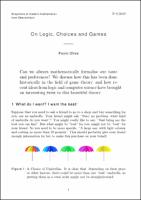| dc.contributor.author | Oliva, Paulo | |
| dc.contributor.editor | Munday, Sara | |
| dc.contributor.editor | Jahns, Sophia | |
| dc.date.accessioned | 2019-09-04T12:14:37Z | |
| dc.date.available | 2019-09-04T12:14:37Z | |
| dc.date.issued | 2019-09-04 | |
| dc.identifier.uri | http://publications.mfo.de/handle/mfo/2515 | |
| dc.description.abstract | Can we always mathematically formalise our taste
and preferences? We discuss how this has been done
historically in the field of game theory, and how recent
ideas from logic and computer science have brought
an interesting twist to this beautiful theory. | en_US |
| dc.language.iso | en | en_US |
| dc.publisher | Mathematisches Forschungsinstitut Oberwolfach | en_US |
| dc.relation.ispartofseries | Snapshots of modern mathematics from Oberwolfach;2019,09 | |
| dc.rights | Attribution-ShareAlike 4.0 International | * |
| dc.rights.uri | http://creativecommons.org/licenses/by-sa/4.0/ | * |
| dc.title | On Logic, Choices and Games | en_US |
| dc.type | Article | en_US |
| dc.identifier.doi | 10.14760/SNAP-2019-009-EN | |
| local.series.id | SNAP-2019-009-EN | en_US |
| local.subject.snapshot | Algebra and Number Theory | en_US |
| local.subject.snapshot | Analysis | en_US |
| local.subject.snapshot | Discrete Mathematics and Foundations | en_US |
| dc.identifier.urn | urn:nbn:de:101:1-2019091815092931756886 | |
| dc.identifier.ppn | 1677287845 | |


